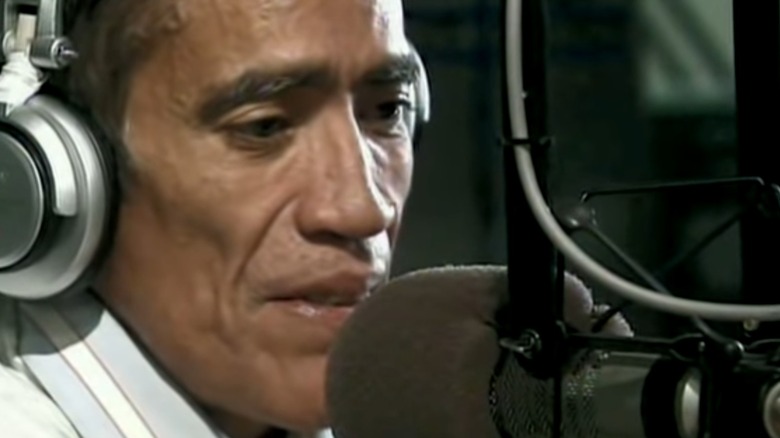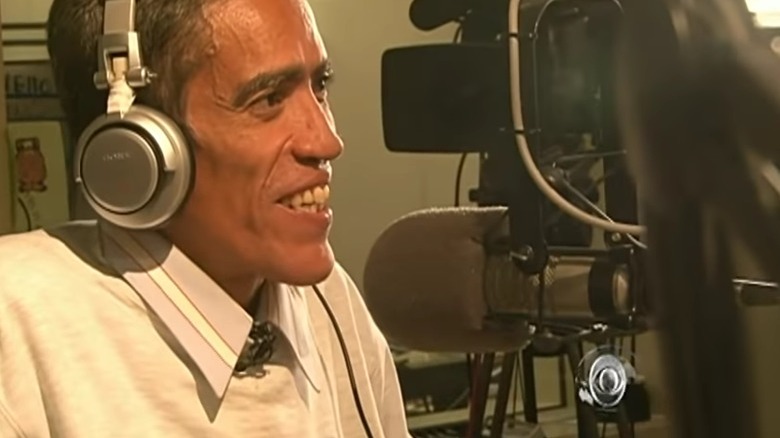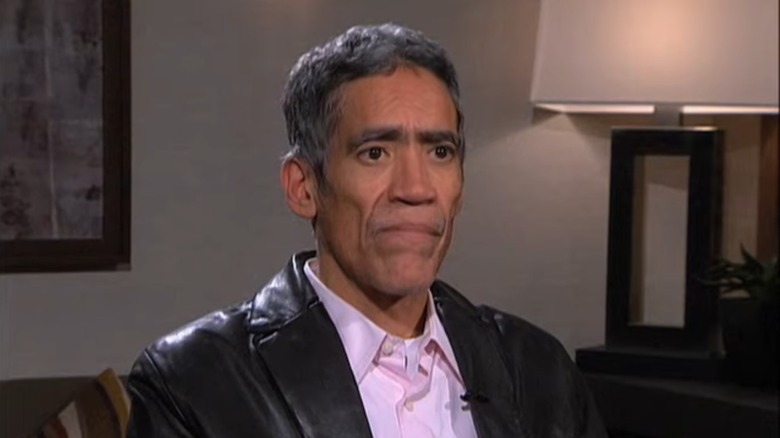The Tragedy Of The Man With The Golden Voice Explained
In the current state of the world, sometimes it's hard to imagine that miracles can actually happen. But, on occasion, there are those stories that will catch the public imagination, because they almost force everyone to remember that sometimes, good things can happen. Dreams can come true; miracles really do happen.
The best example of that might just be the story of Ted Williams, widely and popularly known as the man with the golden voice. No joke, Williams' story reads almost like a modern fairy tale (not even one of those Brothers Grimm fairy tales). As far as the world at large has been concerned, Williams was discovered by pure chance in 2011, as a unhoused man begging for money in the middle of the road. The journalist taking the video was just looking for a good scoop and asked Williams to work for his money, asked him to show off this apparently God-given golden voice he advertised on his handwritten sign.
And all of a sudden, the video of Williams' smooth baritone went viral, his first ever YouTube video racking up millions of views. Nearly overnight, Williams was being approached with offers for work in radio and voice over; almost instantly, he was something of a celebrity, and his future seemed set. In reality though, that future wasn't exactly smooth sailing, and Williams had a rather hard history of addiction, on top of that.
The following article includes references to and descriptions of addiction.
Despite his hopes, the Army wasn't the way out that Williams wanted
Ted Williams didn't exactly have the best relationship with his father. To put it simply, his father didn't approve of his youthful ambitions to make it as a radio broadcaster. And so, in an act of equally youthful rebellion, he ran away and joined the army at the age of 17. But, as he explained in his biography, "A Golden Voice," things didn't go smoothly.
He very nearly flunked out of basic training; at one point, one of his commanding officers actually showed up in the middle of the night, confronting him after he'd carried hundreds of dollars worth of snacks with a plan to resell all of it for a profit. The drill sergeant forced Williams to eat all of that food, and Williams was convinced he'd be kicked out the next morning. Williams only seemed to make it through to graduation by lying, saying that his cousin, featured in a photo on his nightstand and who caught the officer's eye, was actually a sister he didn't have.
But even afterward, all he saw with the Army was a future of meaningless work that would take him nowhere toward his goals. He started drinking and eventually became something of a black market dealer for his fellow soldiers, acquiring items for them and making sales without authorization. His activities eventually caught up to him — one particular sale nearly got him a court martial — but his commanding officers liked him enough to simply send him away with a dishonorable discharge.
Williams had a longstanding addiction to alcohol
Ted Williams' life includes long-term addiction issues. For the most part, that was drug addiction — specifically to crack cocaine — but as it turned out, that wasn't Williams' only form of addiction.
In reality, Williams had an unhealthy relationship with alcohol long before cocaine ever entered his life. In Williams' biography, "A Golden Voice," he mentioned that it went back to his childhood. He was as young as 8 years old when he was sneaking sips from the drinks he poured for his father, and the issues really only escalated from there. Williams even started accepting drinks from those around him or buying vodka to go with his school lunches. It became something of a crutch for him, a form of escape. It was a way for him to get away from the abuse he faced from his father, but it was also a way for him to feel like he was an independent, confident adult. It allowed him to let loose and have fun with his peers or those older than him.
That addiction carried over into his time in the Army, and it got bad enough that he actually considered cocaine to be his savior, of all things. As he put it, "If crack hadn't come along, I'd be a drooling idiot with wet brain by now. That's how much I loved the taste of liquor."
He chose drugs over his career
After being discharged from the Army, Ted Williams managed to land his dream job: a primetime spot on a new station in Columbus, Ohio. Everything seemed to be going well, at least on the surface.
Back at home, he still had his substance abuse issues. By chance, he smoked a joint with crack cocaine in it, and from that moment on, Williams was hooked. Like alcohol beforehand, it became a form of escapism for him, but it began to take over his life. At first, he allowed himself to just smoke on the weekends, then that expanded to the end of weekdays; eventually, he justified it as a lifeline, the only reason he wouldn't drink himself into oblivion.
It didn't take long for his addiction to start affecting his career. The radio show he'd longed for just became an obstacle he had to get through in his day. All he wanted to do was finish his show as quickly as possible — how it went was of no concern — and meet his dealer (who would meet him right outside the station every day, like clockwork). After just two months on the radio, he gave up his dream job so that he could devote every hour of every day to smoking with his girlfriend.
Williams was desperate for crack
It's one thing to say that someone is addicted to cocaine — or to know what science says crack cocaine does to the body – but it's another entirely to see just how deeply that addiction affects their everyday life. And that description is one that Williams doesn't shy away from in "A Golden Voice."
Once he'd left his job at the radio station, he and his girlfriend did nothing but smoke, and that's hardly an exaggeration. Quite literally, all they cared about was getting high, and that became the center of their social life. If people came over to their home? They would have to pay a tax — "a hit of crack to get in the door." Their friends just became the people that they smoked with; those who Williams hadn't gotten hooked on cocaine had long since left. On top of that, any money that Williams made through the occasional radio spots he did immediately went to more drugs. And when that revenue stream wasn't enough? Well, there were always things in the home to sell for money: furniture, jewelry, you name it.
But the most vivid depiction of Williams' addiction might come from how he literally searched for every crystal of crack cocaine he could get. He literally scouted across the floors for any speck of white that could be cocaine, leading him to accidentally smoke cat litter or rock salt. But his desperation ran so deep that, sometimes, he just smoked the salt, pretending it was crack.
He resorted to stealing to fund his addiction
Since finding fame, Ted Williams has been open about the low points of his life, including the stints that he did in prison, even going so far as to say that he'd spend multiple months a year inside a cell. A life of crime wasn't unfamiliar to him.
As he explains in "A Golden Voice," he needed the money to help fund his addiction, and so he turned to petty theft. It started right after he lost his job with the radio station, when he did his best to swipe all their CDs on his way out the door; his dealer at the time really loved music, and that mattered more than any burned bridges. From then on, he turned more and more toward shoplifting, cobbling together $20 at a time, even as news spread that he was a petty thief and more store owners recognized his face.
But this wasn't some thrilling life of crime, the kind of thing depicted in movies. Sure, he'd use his charms to talk his way past cashiers and take his spoils to local nightclubs, where he'd become known as a small-time supplier. He even kept a list of clients in his head and took jobs as they came in. But this was just shoplifting at the request of normal people — nothing glamorous. As Williams wrote: "Robbing banks? No, not me. I stole detergent, deodorant, toothpaste, and soap from drugstores. My big score was Oil of Olay face cream, because it was a small container."
Williams destroyed his relationship with his family
Ted Williams has nine kids in total and has mentioned his strained relationships with them, explaining, "From time to time, they would say, 'Daddy, you're just wasting your talent' or 'Daddy, if I had a voice like that I would be doing this, that and the other'" (via ABC7). And they have understandable reasons to be upset.
His oldest daughters remember him taking alcohol with him to work, then never coming home, or smoking crack in the park in front of them. Even after his daughters grew up, things didn't get better; Williams even recalled one occasion (via "A Golden Voice") in which he started eating the baby food his daughter had bought, despite knowing all the while that it was wrong — his daughter was a struggling single mother, and he'd literally taken food from his own grandchild.
Then there are also his sons, who were born around the time his addiction to crack began; in fact, his youngest son Tyrell was actually born while Williams' girlfriend was in prison. As Williams recalled, "I picked Tyrell up, walked out of the hospital, took the bus to my aunt's house, and left him there." Around the same time, his older son, Desmond, was with Williams' mother; eventually, Williams and his girlfriend had both of them back, but it was far from a healthy home. Tyrell was fed nothing more than sugar water, and they even took food meant for the kids back to the store, returning it for money to spend on drugs.
His father's funeral drove a wedge between him and his mother
Even without further context, just knowing that Ted Williams missed his own father's funeral is pretty tragic. But there's more to the story than that — a fact that makes quite a bit of sense when you know that Williams was deep into his drug addiction at the time of his father's death.
His family really tried to support him at the time, doing everything they could to get him there. His mother sent him money to travel, telling him (via "A Golden Voice"), "I want you to stand by me, Teddy. I want you here for your father's funeral." His aunt and uncle made all the necessary arrangements, setting him up with a hotel in Brooklyn. But on the day of the funeral? Williams wasn't there; instead, he'd spent all the intended travel money on more drugs that he smoked in the preceding days. The only thing in that Brooklyn hotel room was an unused suit.
Things changed between Williams and his mother after that. She refused to hear his apologies for a full year, and he recalled her first words to him: "'You could not even stand with me. You could not even be there when I lost my husband. Good-bye' ... When she said that, I felt it in my soul. I had disgraced the memory of my father ... but I had also betrayed my momma. And I couldn't escape it."
He kept pretending that things were alright
In recalling his life, Ted Williams often made it sound like there wasn't really anything wrong. His past self made it sound as if he still held himself with a sense of pride, as if he still had his dignity. But all of that attitude? It was all a facade, a bunch of bluster.
That said, it wasn't bluster that he didn't believe. On the contrary, he genuinely thought that everything was okay for a while. In his own words, he explained (via "A Golden Voice"), "Those first years, though I was still smiling, saying, It's all right, people, Ted Williams is fine, even though nobody was fooled. Because I was fooled. I believed it. To survive some days, I had to believe it." And after those first few years? Well, he openly admitted that lying about his attitude became more of a habit than anything else — and a hard one to break, at that — but even when he couldn't quite lie to himself anymore, he still wanted to lie to everyone around him. He wanted them to believe that he was smart, happy, and harbored no shame over what was happening.
Over time, after seeing how his family wanted better for him, he could eventually admit the truth. He wasn't some glamorous gangster, living the high life and experiencing something like the untold truths of Al Capone. As he put it, "I was nothing more than a broken man desperately hustling for the next fix."
Fame didn't help his addiction issues
As much as Ted Williams' story of going viral and finding fame might seem like something of a fairy tale, it turns out that miracles might only make health issues — like addiction — even more complicated. Money and celebrity might seem nice, but they weren't solutions for Williams.
Williams was swept up in his huge media frenzy after going viral — job offers, interviews, the works. But, as he explained on the Tamron Hall Show, he'd barely been clean and sober for 30 days when that video was taken and jobs were being thrown his way. He started signing a bunch of contracts for gigs, agents, and lawyers, and it all just proved too much for him. Twice in 2011 alone, he ended up relapsing and started to drink again — something that he admitted to while speaking with Dr. Phil. Following that admission, he voluntarily checked into rehab, but he didn't actually stay for long, which prompted some concern. Williams explained his actions, saying, "I walked out of treatment because it was a little scripted, I felt. There was no anonymity ... I am going to try and truly get back into the swing of things" (via E News).
As time has passed, Williams does seem to have kept that promise. After all, as of his 2021 interview with Hall, he'd been sober again for years.
He has found himself unhoused again
While fame certainly exacerbated Ted Williams' addiction issues, it did seem like it would solve his financial issues. Makes sense, given that he was flooded with job offers, became the spokesman for good old Kraft Macaroni and Cheese, got his own weekly radio show, and was given a nearly $400,000 advance on his biography.
Despite that — and despite Williams saying in an interview that he should be a millionaire — money remained a problem. Sure, he had a place to stay: hotels paid for by an agent immediately after his rise to fame, then a condo and eventually his own apartment. But that apartment wasn't even furnished, and by 2014, he admitted that he was actually broke, and that those intervening years had been especially hard for him.
Things only went downhill again from there. As finances kept getting tighter, he found himself homeless once again in 2014, and even in 2021, he told Tamron Hall that he was actually still without his own home. Though he didn't go into detail, he did reveal that his stints in prison made it hard for him to get a home, and that his situation hadn't changed much in the past seven years. He wasn't out on the streets, mind — rather, at the time of the interview, he was staying with a friend — but he did have hope for the future and was grateful that he and his family had fully reconciled over the years.
A part of him almost wishes he'd never gone viral
Who hasn't thought about how cool it would be to go viral with some bizarre YouTube channel? It's just such a tantalizing thought, but Ted Williams has found that Internet fame is sort of a double-edged sword.
On one hand, Williams is grateful that the whole thing happened, per "A Golden Voice." He recognizes that his video going viral changed his life for the better, but at the same time, he explains that he can hardly watch the clip that made him famous. In his own words: "The world might hear a homeless man with a golden voice ... but I see a version of myself I don't like." To him, all he saw was himself at his lowest, a reminder of exactly how bad things were. And one that he can't ignore or deny. There was no hiding that he was desperate and willing to do anything for a dollar — no hiding from the fact that he'd thrown away the life he'd once had.
That said, he's lightheartedly recognized other drawbacks to fame, as well, explaining to Tamron Hall that sometimes he wishes he hadn't gone viral: "There are people that I see on the streets of Columbus, Ohio that, from time to time — 'Hey, are you that dude?' And then, 'Let's take a selfie' — and I'm in the middle of eating."
If you or anyone you know needs help with addiction issues, help is available. Visit the Substance Abuse and Mental Health Services Administration website or contact SAMHSA's National Helpline at 1-800-662-HELP (4357).











